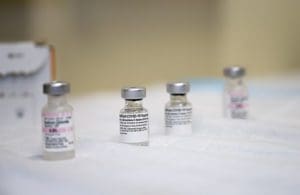
Doses of the COVID-19 vaccine at Walter Reed National Military Medical Center, Bethesda, Md. DoD photo by Lisa Ferdinando.
A handful of companies are making billions of dollars in revenues from COVID-19 vaccines. Especially well-positioned is Pfizer, which could earn $33.5 billion in COVID-19 vaccine sales this year, as it announced in its Q2 earnings statement. By contrast, J&J has forecasted $2.5 billion in COVID-19 vaccine sales this year, while AstraZeneca has seen sales of $1.1 billion in the first half of this year, according to Moody’s.
Analysts are divided, however, on how strong vaccine sales will be in 2022 and beyond.
A report from Moody’s predicts that vaccine sales next year will begin to wane given significant vaccine penetration rates and uncertain demand for boosters. Vaccine penetration rates in many G20 countries have already surpassed 60%. As a result, COVID-19 vaccine revenue in 2022 will “depend to a large extent on how broadly booster shots will be approved and recommended,” wrote Moody’s senior vice president Michael Levesque.
Bloomberg Intelligence senior industry analyst Sam Fazeli concluded that government contracts are likely to guarantee strong vaccine sales in 2022 and possibly 2023.
For instance, Pfizer and BioNTech have agreed to sell up to 1.8 billion doses of their vaccine to the European Union in 2022 and 2023. The agreement includes a firm order of 900 million doses with an option to purchase another 900 million optional ones. If the companies were to sell the entire 1.8 billion doses, the contract would be worth $41.4 billion, with Pfizer and BioNTech splitting the money evenly. Even if the two companies were to only sell 900 million doses, Pfizer and BioNTech would each see $10.35 billion apiece in COVID-19 vaccines sales.
Already, Pfizer’s agreements with the U.K and EU alone are worth as much as $11 billion in 2020.
Bloomberg Intelligence estimates that 2022 sales of the Pfizer-BioNTech vaccine will be worth at least $23.7 billion.
The influx of cash could lead Pfizer to pursue more acquisitions in the near future. Already, the company has agreed to acquire the oncology company Trillium Therapeutics for almost $2.3 billion.
Fazeli, however, concedes that the long-term sales prospects of COVID-19 vaccines are “a lot less certain.”
The prospect of effective mRNA booster doses could lead to a durable immune response. As a result, it “may be possible that further shots of the vaccines may not be needed, or needed only once every three or four years,” Fazeli wrote. But governments may “opt for annual vaccinations if side effects are manageable,” he concluded.